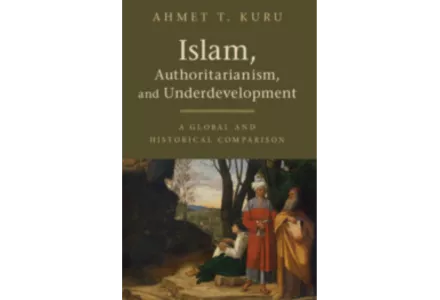A seminar with Ahmet Kuru on his recent book Islam, Authoritarianism, and Underdevelopment: A Global and Historical Comparison from Cambridge University Press, moderated by Ousmane Kane, Prince Alwaleed Bin Talal Professor of Contemporary Islamic Religion and Society, Harvard Divinity School. This seminar is co-sponsored by the Alwaleed Islamic Studies Program at Harvard University.
About the book
Why do Muslim-majority countries exhibit high levels of authoritarianism and low levels of socio-economic development in comparison to world averages? Ahmet T. Kuru criticizes explanations which point to Islam as the cause of this disparity, because Muslims were philosophically and socio-economically more developed than Western Europeans between the ninth and twelfth centuries. Nor was Western colonialism the cause: Muslims had already suffered political and socio-economic problems when colonization began. Kuru argues that Muslims had influential thinkers and merchants in their early history, when religious orthodoxy and military rule were prevalent in Europe. However, in the eleventh century, an alliance between orthodox Islamic scholars (the ulema) and military states began to emerge. This alliance gradually hindered intellectual and economic creativity by marginalizing intellectual and bourgeois classes in the Muslim world. This important study links its historical explanation to contemporary politics by showing that, to this day, ulema-state alliance still prevents creativity and competition in Muslim countries.
Praise for Islam, Authoritarianism, and Underdevelopment
"Generations of thinkers have puzzled over why the Muslim world, once intellectually creative and commercially vibrant, fell behind economically and came to symbolize repressive governance. In this meticulously researched, insightful, and provocative book, Ahmet T. Kuru attributes these interlinked transformations to complex alliances between religious officials and states. Islam, Authoritarianism, and Underdevelopment will captivate scholars in many disciplines, and also the broader public interested in Islam's intellectual, political, and economic roles through the ages."
- Timur Kuran, Duke University, North Carolina
"Ahmet T. Kuru offers a nuanced interpretation of the links between Islam and authoritarianism, in which the religion is not the culprit, but complex socio-political developments are to be blamed for the near-failure of Islamic societies to develop democracy and an innovative economy. His historical analysis sheds new light on a highly important and sensitive debate, and helps us to understand better the deep roots of the Islamic Sonderweg."
- Jan Luiten van Zanden, Universiteit Utrecht, The Netherlands


